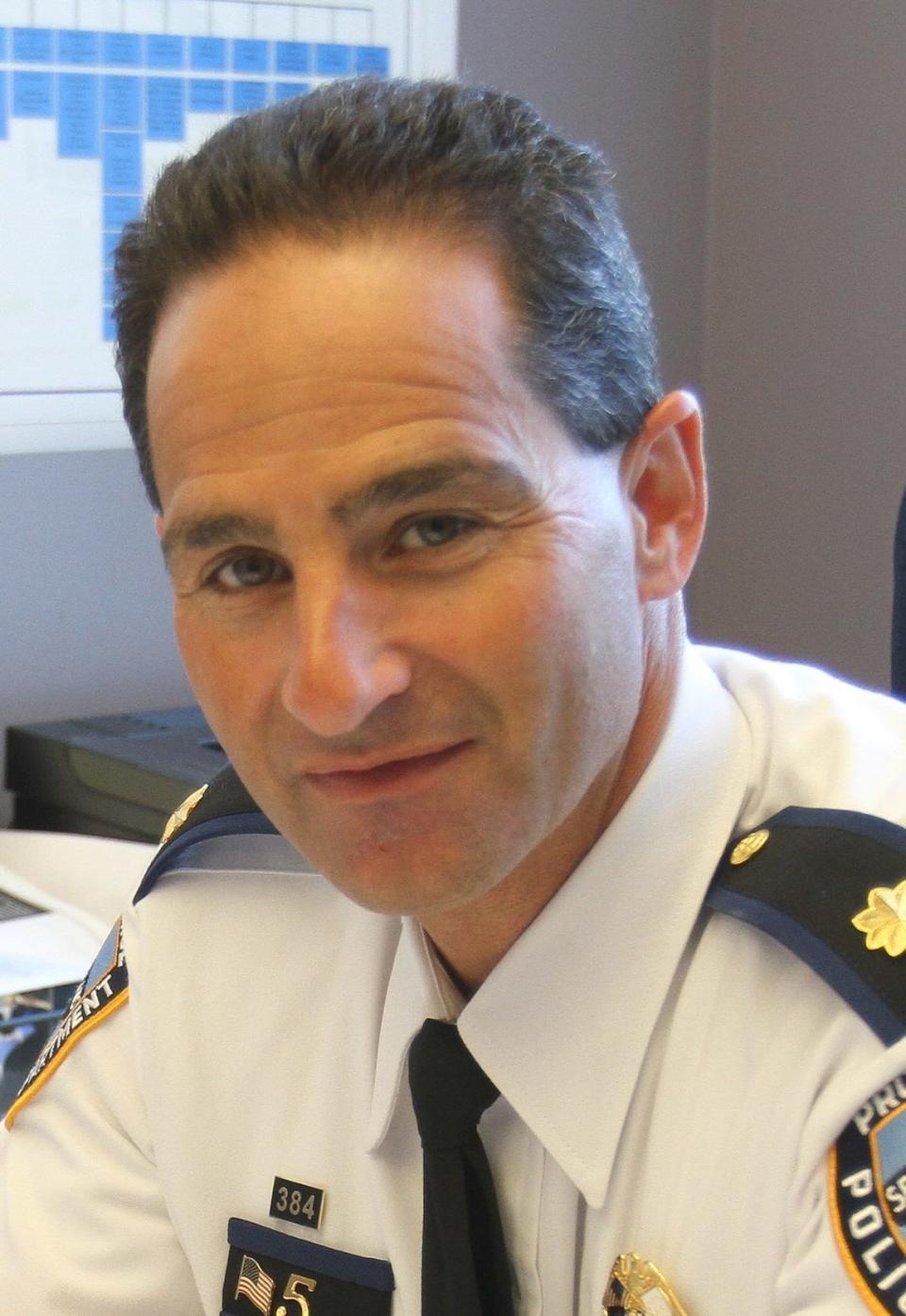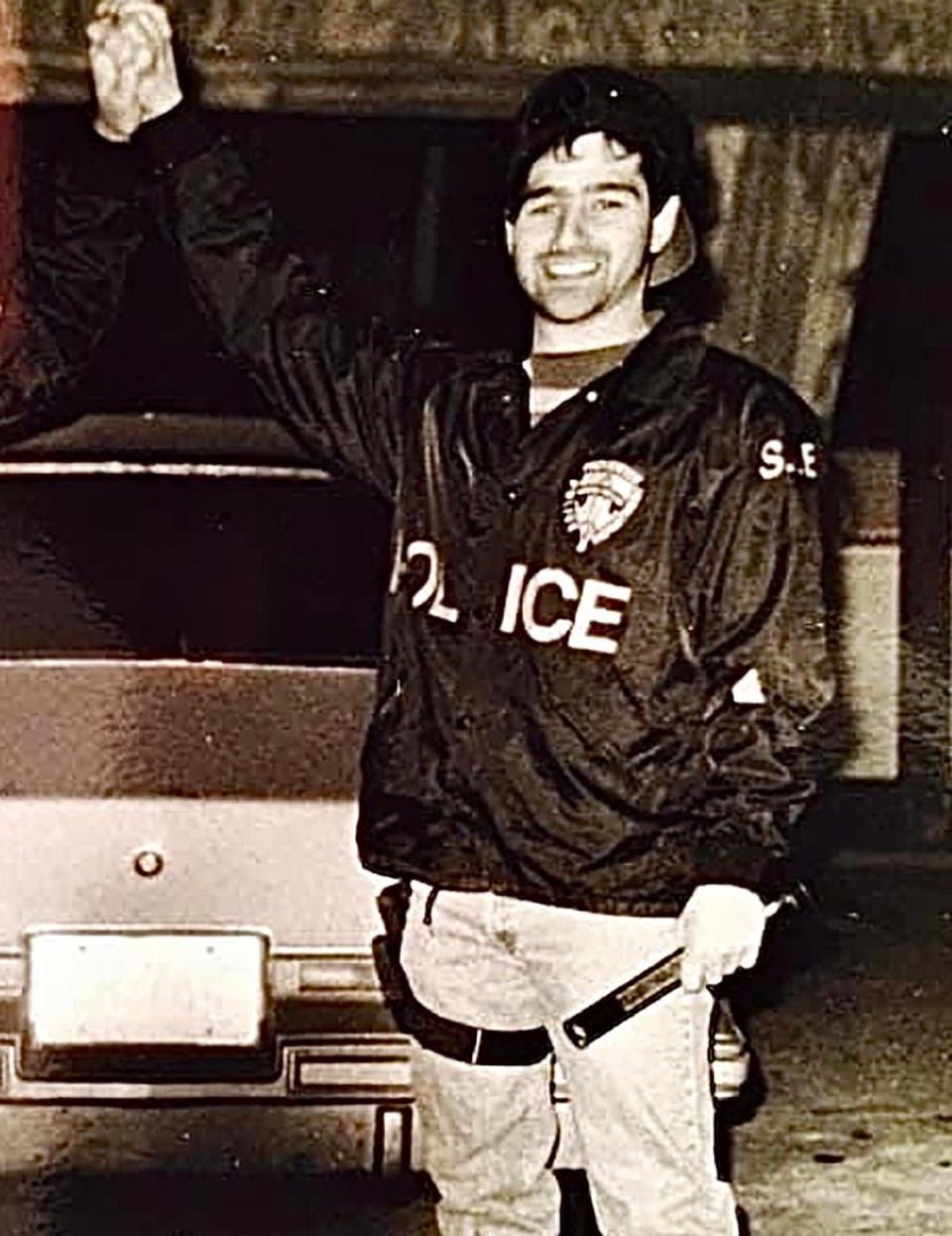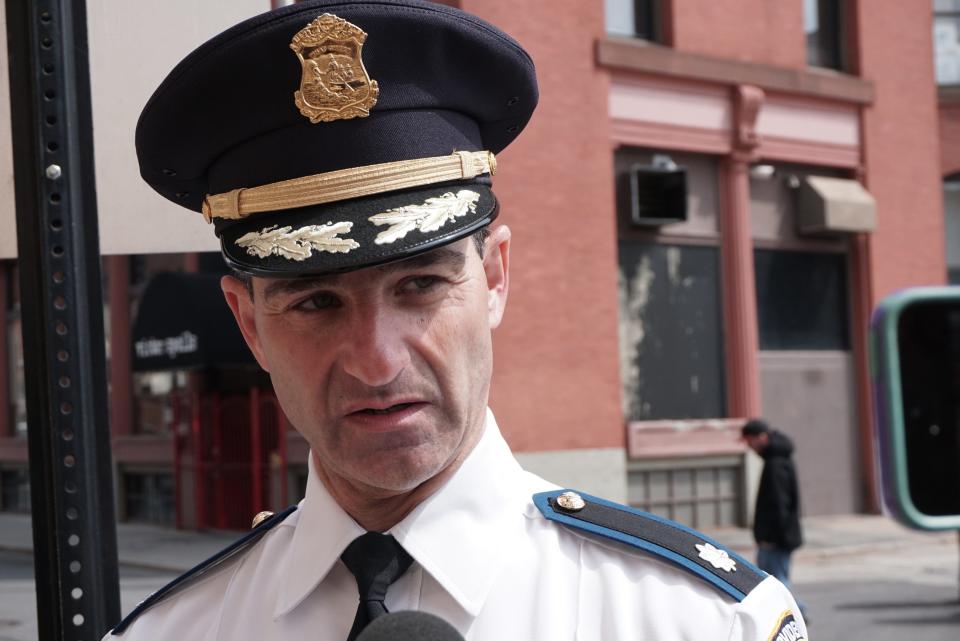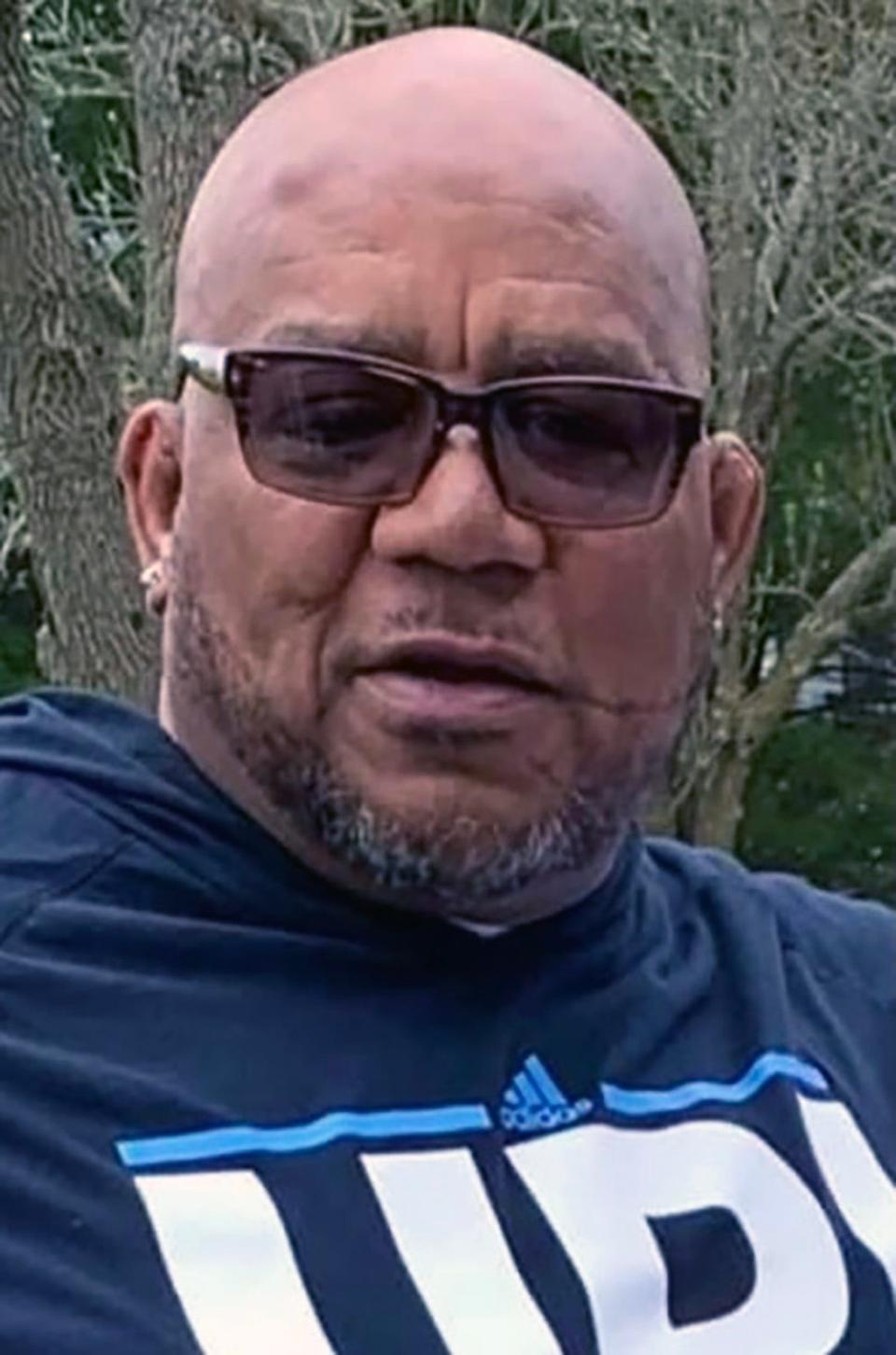Street cop turned Deputy Police Chief Tom Verdi will leave quite a legacy in Providence
I asked Deputy Chief Tom Verdi, who holds the second-highest rank at the Providence Police Department, if he ever fired his weapon on duty.
I had called him because after 35 years on the state’s biggest force, with recent family issues needing his attention, he’s retiring at age 58.
His answer was yes, yet Verdi said it gravely. Television dramas glorify such moments, but in life, cops are often haunted by them.
Verdi can still picture the dark hallway where it happened, on the top floor of a three-tenement crack house on Elmwood Avenue.

It’s the early '90s, and Verdi is in his late 20s, undercover with beard and long black hair, assigned to make a drug buy. He is standing by a closed apartment door where police know dealers inside have been selling crack cocaine.
It’s around 10 p.m. Verdi puts money through a slot below the peephole when a voice from inside says, “Who are you? Who sent you?”
Verdi ad-libs, “I’m John. I was here two nights ago …”
Suddenly, the door opens and a man in a blue hooded sweatshirt is there with a large handgun in his right hand at his side. Behind him, another man says, “You’re a f------ cop, aren’t you?”
Verdi’s own service weapon is on the back of his belt beneath a windbreaker. As he reaches for it, he realizes the man will have time to fire first.
More from Mark Patinkin:This RI high schooler is pen pals with a player on the NY Jets. Why it may save his life.
So Verdi shouts, “You’re going to shoot a cop.” The door slams as Verdi pulls the gun and fires through the wood.
Verdi’s bullet misses, but with plenty of fellow officers surrounding the house, the men are arrested; drugs and guns seized. Still, today, Verdi wonders if his shouted response saved his life.
Although he was shaken by it, for cops, such an incident is also, in essence, a day at the office. When Verdi got home at 2 a.m., he decided not to wake his wife, Kim, or their young children, so he didn’t tell her until morning.

Serving the community, on and off the police force
As a reporter, I’ve worked with Deputy Chief Tom Verdi often over the years, and I can tell you his departure will leave a hole. Like any urban police force, the one in Providence, with 500 officers when fully staffed, has its critics, but it’s known for striving to connect with the community, and Verdi was a big part of that.
Among other things, he has served on the board of the homeless-aid group Crossroads Rhode Island and was the first Providence cop on the state parole board. In a beautiful personal chapter, when he was a youth baseball coach, Verdi mentored a fatherless 13-year-old player of color who a few years ago was sworn in as an officer in Verdi’s own force. If you ask Verdi how many kids he has with Kim, his East Greenwich High School sweetheart, he includes the mentee and says five.
Journalists often need to reach out to high-ranking folks, which can take time. Verdi was as responsive as any I've known. When I would text him, even when he was on vacation, he’d put the beach on hold and help me line up an officer interview or ride-along.
So I’m glad he never went to law school.
Both his parents wanted him to after he graduated from the University of Rhode Island, and indeed, Verdi was accepted at a few, including Suffolk University in Boston. But since a sixth-grade career day, where he talked to an officer, he’d wanted to be a cop.
More from Mark Patinkin: Honoring Providence police officer Jimmy Allen on the anniversary of his murder
So, while one of his two brothers became an East Greenwich real estate agent and the other, Chad, a prolific producer of movies, including “Bleed for This,” about boxer Vinny Paz, Tom Verdi put on a Providence police uniform.
He was sworn in on March 1, 1987, later getting a master’s in criminal justice at Boston University, which could have opened other career doors, but he chose to stay put.
I asked if there were other times he'd drawn his gun. I was surprised when he said, “hundreds.” That’s because Verdi worked both narcotics and the SWAT team, and when executing warrants in drug or firearms cases, it can be too late if you’re not ready for a lethal reaction.
One such time was at 1 a.m. on a morning in October 1994. Verdi was hiding inside a garage as part of a sting targeting a New York City crew with mob connections who’d been ripping off drug dealers. The six suspects came in and began to grab kilograms of fake cocaine that undercover cops had steered them to.
At that, Verdi gave a signal for others to set off concussion grenades. Still, the suspects began a shootout, and when it was over, one of the six was dead and two wounded.
No officers were shot, yet it could have happened, and it’s the kind of moment, Verdi says, where you always wonder if that might have been the end.
Recalling his two most difficult moments
But he told me there were harder moments emotionally, especially two. Verdi had to help with death notifications to the families of fellow officers Jimmy Allen, murdered by a suspect in 2005, and Max Dorley, killed in a car crash in 2012 while responding to a call.

In Dorley’s case, two rows of officers were waiting at the hospital outside the emergency room while doctors worked on their brother officer. After they pronounced him, as Max Dorley was wheeled out under a sheet, Verdi called for all to stand at attention, and at his command of “Order arms,” they gave the respect of a final salute.
And then there was the June 2, 2020, riot downtown after George Floyd was killed. Store windows were smashed and 10 Providence cops hurt by thrown bricks and bottles. Verdi was a lead commander that night, and he spent a lot of time afterward talking to officers demoralized by the defund movement. He pointed out that the riot would have been catastrophically worse without them, a reminder of how essential "the job" is to society. Still, Verdi will tell you that 2020 and 2021 were the most difficult of times for cops.
Six years ago, Tom Verdi was promoted to deputy chief. It was after a long climb. He spent his first years as a patrol officer, often working 11 p.m. to 7 a.m., sometimes with back-to-back shifts that turned into 16-hour days. He moved to narcotics, but later, upon being named sergeant, he was back on patrol, and the same when, after making detective, he in time got another promotion and was on the street again as lieutenant in charge of the midnight shift.
But he welcomed it. Verdi felt, and still does, that police do their most important work on patrol.
More from Mark Patinkin:Whatever happened to Claudine Schneider, the only woman to serve RI in Congress?
High praise from a former criminal
Which got me thinking about who to call for some observations about him. Usually in a story like this, you’d talk to a fellow cop, or a superior, like the chief.
Instead, I called Alex Snow, now 58, a former criminal who was arrested by Tom Verdi many times. Snow served 17 years for second-degree murder.
Today, he works with Providence's Nonviolence Institute and his own Instinctive Choices organization, giving talks to schools, group homes and gang members to steer younger folks away from the kind of bad choices he made.

“Tommy,” he says of Verdi, “was instrumental in turning my life around.”
Even when Snow was on the wrong side, he was impressed with how Verdi handled volatile street moments.
“I've seen him defuse so many situations that could have ended up turning into a powder keg,” Snow said.
He told me Verdi’s street name was “Ninja.”
“He’d be on top of a guy before they could see him coming,” said Snow.
More from Mark Patinkin:Providence cop's quiet act of kindness is captured on Facebook
But even when arresting Snow, Verdi showed he wanted to help.
“He always said, ‘You’re better than this,’” Snow recalled. “And, ‘You’re going to break your mother’s heart.’ And I did. And that’s one reason why I do the work in the schools now, in memory of my mom." But mostly, Snow added, it's in penance for the people he victimized.
He partly came to that mission from visits Verdi made to him in prison. “He’d tell me, ‘It’s not enough to come home and be a good citizen," Snow recalled, "you have to make a difference.” And he now does, with Snow telling me that Tom Verdi is a model to him of how to give back. “From when he was a rookie,” said Snow, “all the way until now.”
One final memory from Verdi.
He was among 15 Providence cops sent for weeks to assist the NYPD after 9/11. He still remembers the smoldering pile, the fuel oil smell and the endless days put in by first responders. To Verdi, it was a symbol of all cops — the way that, by serving their communities, they serve their country, too.
It’s what Deputy Chief Verdi did here in Providence for 35 years.
Tom, you stood a good post.
— mpatinki@providencejournal.com
This article originally appeared on The Providence Journal: Providence Police Deputy Chief Tom Verdi retiring after 35 years

